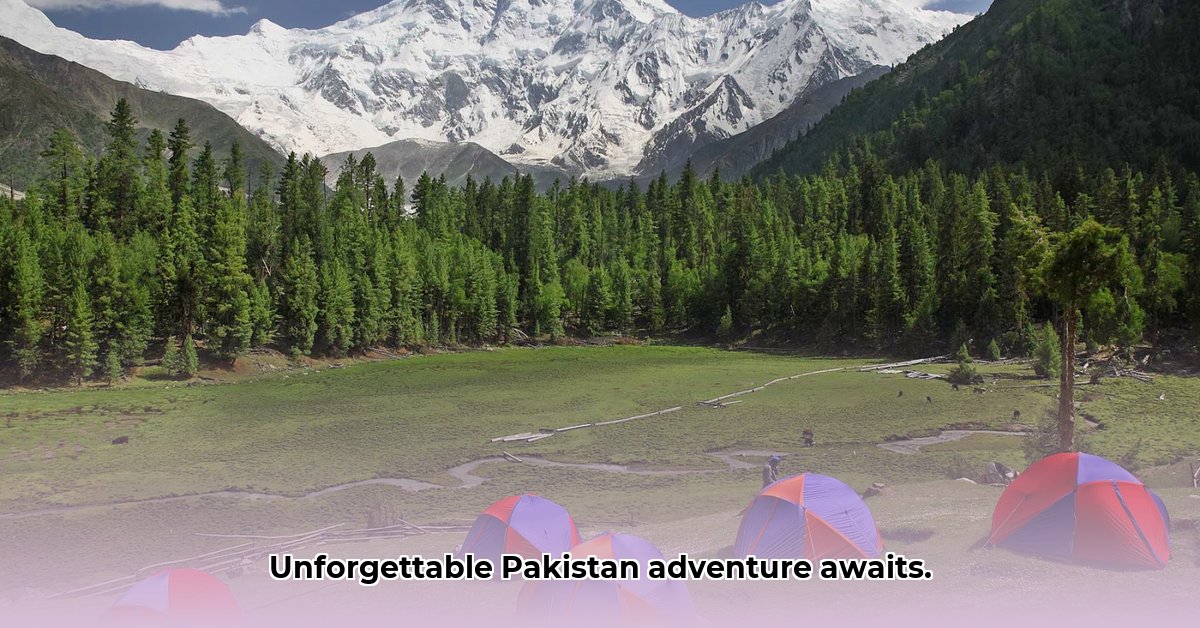Ready for an epic adventure? Pakistan’s Northern Areas beckon with towering mountains, sparkling lakes, and villages brimming with vibrant culture. This guide will help you plan an unforgettable trip, explore responsibly, and create lasting memories. For similar breathtaking landscapes closer to home, check out this Georgia travel map.
Exploring the Majestic Pakistan Northern Areas: Plan Your Adventure
Imagine majestic mountains, lush valleys carpeted with wildflowers, and ancient cultures. Let’s help you plan your trip!
Crafting Your Perfect Itinerary: Seasonality and Style
What’s your dream trip? Luxurious resorts in Hunza Valley or rugged backpacking? Your style impacts budget and itinerary. Luxurious options exist, especially in Hunza and Skardu. Exploring remote areas requires careful preparation and flexibility.
Spring and autumn offer pleasant weather and fewer crowds, while summer is vibrant but a peak season. Winter offers a snowy wonderland, but access is limited. Match the season to your style.
Consider transportation. Flights to Gilgit and Skardu offer a less stressful start. Local travel relies on jeeps or buses. Hiring a driver provides flexibility, but public transport adds to the adventure. Finding the option that fits your style and budget is key.
Sustainable Travel Guide: Making a Positive Impact
The Northern Areas’ beauty is fragile. Responsible tourism preserves its wonders and supports communities. How do we tread lightly?
- Support Local Businesses: Choose locally-owned businesses to directly support communities. Eat at local restaurants, stay in family-run guesthouses, and purchase handicrafts directly from artisans.
- Respect Local Customs: Dress modestly, especially when visiting religious sites or rural areas. Ask permission before taking photos of people. Learn a few basic Urdu or local language phrases.
- Minimize Your Environmental Footprint: Pack out all trash, use reusable water bottles, and avoid single-use plastics. Choose accommodations and tour operators with eco-friendly practices.
- Choose Responsible Tour Operators: Research tour operators committed to ethical practices, fair wages for guides and porters, and environmental conservation. Look for certifications or affiliations with sustainable tourism organizations.
Cultural Immersion: Connecting with Local Life
Discover a rich tapestry of cultures. The Kalash people offer unique traditions. Explore ancient forts like Baltit and Altit Forts in Hunza, wander vibrant markets like the Gilgit Bazaar, and attend local festivals. Remember, you’re a guest; approach interactions with respect and curiosity.
Seven-Day Sample Itinerary: A Journey of Wonder
Here’s a sample itinerary starting in Gilgit, blending adventure and culture. Customize it to your interests. Remember that flexibility is crucial due to road conditions.
| Day | Activity | Location | Notes |
|---|---|---|---|
| 1 | Arrival in Gilgit, explore the city. | Gilgit | Visit the Gilgit Bazaar, Kargah Buddha, and the Gilgit River. Enjoy local cuisine at a traditional restaurant. |
| 2 | Journey to Hunza Valley, visit Altit Fort. | Hunza | Drive along the Karakoram Highway, stopping at scenic viewpoints. Explore Altit Fort and enjoy panoramic views of the Hunza Valley. |
| 3 | Explore Karimabad, visit Baltit Fort. | Hunza | Visit Baltit Fort, learn about the history of the Hunza Kingdom, and explore the local shops in Karimabad. Enjoy a traditional Hunza dinner. |
| 4 | Hike to Attabad Lake, boat ride optional. | Attabad Lake | Hike to the scenic Attabad Lake, enjoy a boat ride, and explore the surrounding area. Visit the Hussaini Hanging Bridge for a thrilling experience. |
| 5 | Drive to Skardu, stay at Shangrila. | Skardu | Drive through the scenic landscapes of Gilgit-Baltistan to Skardu. Check into Shangrila Resort and enjoy the peaceful surroundings. |
| 6 | Explore the majestic Deosai Plains. | Deosai Plains | Take a jeep tour of Deosai Plains, visit Sheosar Lake and Kalaa Pani, and enjoy the unique flora and fauna of the high-altitude plateau. |
| 7 | Departure from Skardu. | Skardu | Visit the Shangrila Lake (Lower Kachura Lake) before departing from Skardu Airport. |
Off the Beaten Path: Discovering Hidden Gems
Explore lesser-known areas like Shounter Valley in Neelum Valley, AJK, or Kumrat Valley in Upper Dir, KPK. They offer pristine beauty and authentic culture. Prioritize safety and research beforehand. Consider hiring a local guide familiar with the area and its conditions.
A trip to Pakistan’s Northern Areas is more than a holiday; it’s a chance to experience something extraordinary. Plan carefully, travel mindfully, and enrich your life for years to come.
Planning a Sustainable Journey: Responsible Travel in Pakistan’s Northern Areas
Key Takeaways:
- Responsible travel is vital to preserving the beauty of Pakistan’s Northern Areas.
- Sustainable tourism supports local communities and protects the environment.
- Careful preparation ensures a positive impact.
Planning a trip to Pakistan’s Northern Areas requires responsible travel to preserve its magic. Let’s explore how to plan a sustainable and responsible trip to Pakistan’s Northern Areas.
Eco-Friendly Trekking & Ethical Mountaineering
Trekking through valleys or mountaineering towards majestic peaks requires ensuring your adventure doesn’t negatively impact the region.
- Partner with Responsible Tour Operators: Research companies committed to sustainability, like those that prioritize “Leave No Trace” principles. Look for operators that provide fair wages and good working conditions for porters and guides.
- Pack Smart, Travel Light: Reduce your impact with reusable items, minimizing waste and transportation emissions. Bring a reusable water bottle, a reusable shopping bag, and a reusable container for food.
- Leave No Trace: Pack out everything, respect wildlife, stay on trails, and minimize campfire impacts. Bury human waste properly and carry out toilet paper.
Engaging Culture & Sustaining Local Communities
The Northern Areas feature a rich tapestry of cultures. Ensure interactions positively contribute to local communities and protect their traditions.
- Support Local Businesses: Choose local guesthouses, restaurants, and shops to directly benefit communities. Buy handicrafts directly from artisans instead of from souvenir shops.
- Respect Local Customs: Dress modestly, ask permission before photos, and learn basic Urdu phrases. Remove your shoes before entering mosques or homes.
- Learn About the Local Culture: Research customs and traditions for a richer, more respectful experience. Read books, watch documentaries, or talk to people who have visited the region before.
Environmental Stewardship & Preserving Natural Resources
The beauty of the Northern Areas requires careful stewardship. Minimize your environmental footprint.
- Reduce Your Carbon Footprint: Consider sustainable travel methods like train travel where possible. If flying, offset your emissions by donating to a carbon offset program.
- Responsible Waste Management: Be prepared to carry your trash and support community waste reduction programs. Participate in organized cleanups or simply pick up litter you see along the way.
- Conserve Water: Be mindful of water usage in mountainous regions where resources are precious. Take shorter showers, avoid washing clothes unnecessarily, and report any leaks you see.
Sustainability in Action: Thoughtful Itinerary Planning
A sustainable itinerary requires thoughtful planning to ensure the environment and local communities are respected.
- Consider the Season: Research the best time to visit based on your interests and the environmental impact. Avoid visiting during peak season to reduce crowding and strain on resources.
- Choose Activities Wisely: Opt for sustainable activities like hiking and cultural exploration over motorized sports. Respect wildlife viewing guidelines and avoid disturbing animal habitats.
- Respect Wildlife: Observe animals from a distance and avoid feeding or interacting with them. Never approach or harass wildlife.
By following these guidelines, your adventure contributes to the region’s sustainability. Responsible travel enhances the experience and leaves a positive legacy.
Responsible Tourism Practices in Pakistan’s Northern Areas for Eco-Travel
Key Takeaways:
- Tourism in Pakistan’s north has surged, creating both opportunities and challenges.
- Responsible Tourism Practices in Pakistan’s Northern Areas for Eco-Travel are essential.
- Collaboration between stakeholders (government, businesses, locals, tourists) is vital.
- Effective waste management is a top priority.
Planning Your Eco-Conscious Trip: A Step-by-Step Guide
Dreaming of Pakistan’s Northern Areas? Plan responsibly.
Step 1: Choosing Your Destination(s)
Research regions to align with interests and adventure level. Consider less-visited areas to spread benefits and lower environmental impact. Explore valleys like Shigar, Astore, or Ghanche instead of just Hunza and Skardu.
Step 2: Selecting Responsible Tour Operators
Opt for companies dedicated to Responsible Tourism Practices in Pakistan’s Northern Areas for Eco-Travel. Look for certifications or community support. Read reviews and ask about their sustainability policies.
Step 3: Minimizing Your Environmental Impact
- Pack light.
- Use reusable items.
- Follow Leave No Trace principles.
- Support local businesses. Bring your own reusable shopping bag for market purchases.
Step 4: Engaging with Local Communities
Respect customs, learn phrases, and support artisans. Your behavior reflects on all tourists.
Step 5: Supporting Conservation Efforts
















